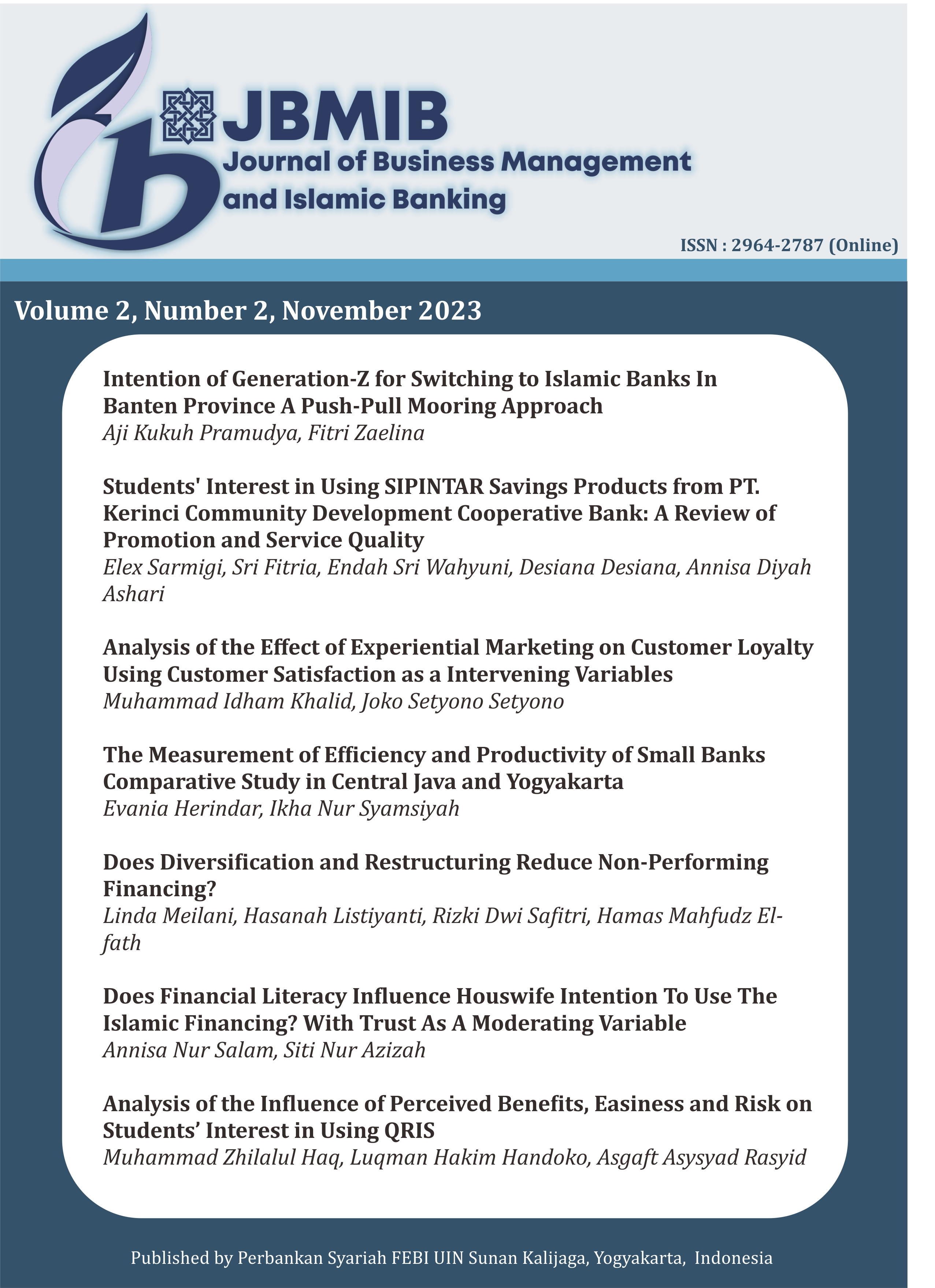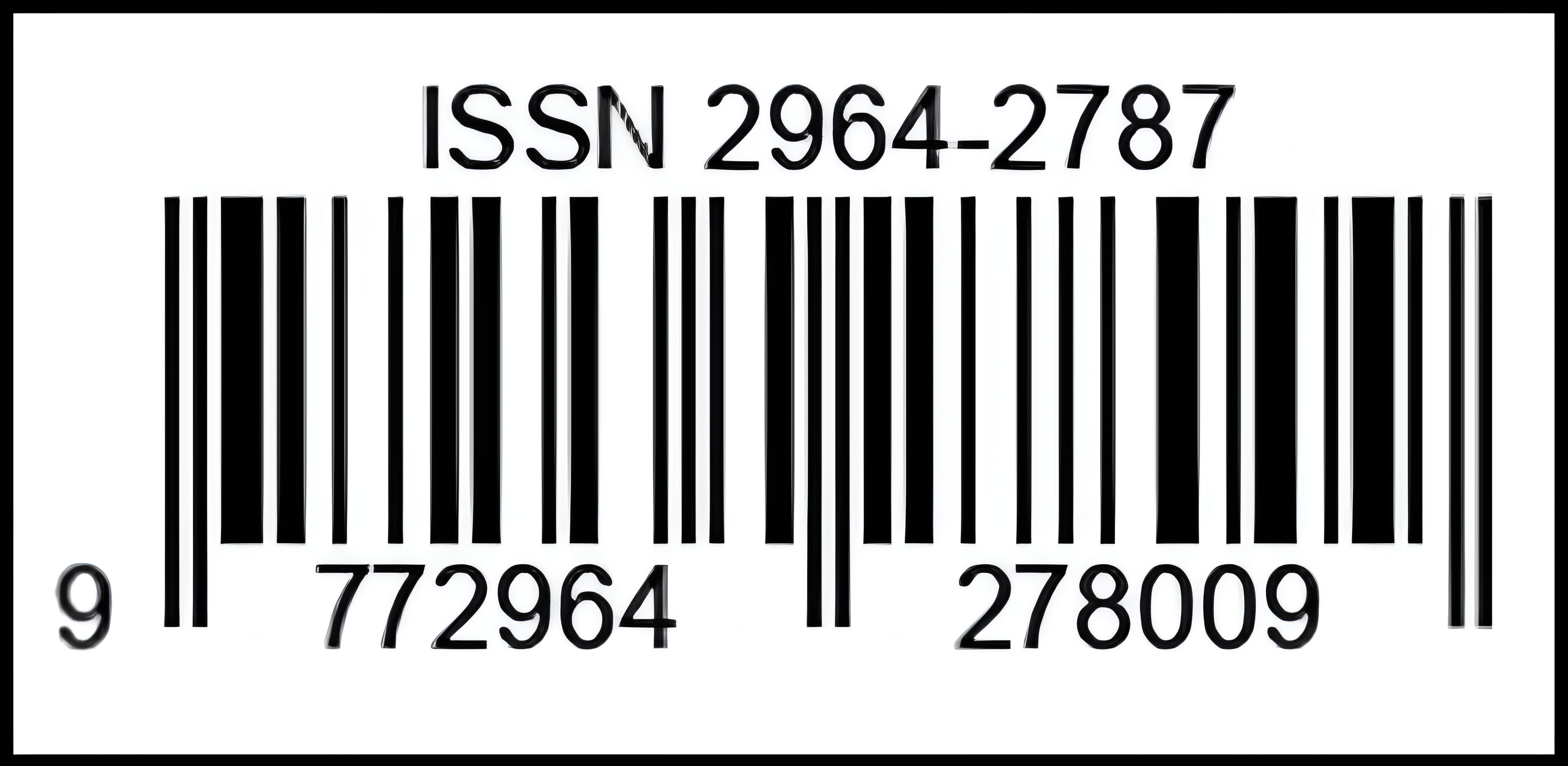Analysis of the Effect of Experiential Marketing on Customer Loyalty Using Customer Satisfaction as a Intervening Variables
DOI:
https://doi.org/10.14421/jbmib.v2i2.2015Keywords:
Experiential Marketing, Customer Satisfaction, Customer LoyaltyAbstract
Research Aims: This research aims to find the influence of experiential marketing, namely sense, feel, think, act, and relate marketing, on customer loyalty at PT. Bank Syariah Indonesia, using satisfaction customer as variable.
Methodology: This research is quantitative with a causality study. The sample is composed of 127 customers from Bank Syariah Indonesia. This research uses non-probability sampling as a sampling technique with purposive sampling and a questionnaire with a Likert scale as a data collection technique. As well as using SmartPLS 3.0 software for analysing data using structural equation modelling (SEM).
Research Findings: The research reveals that sense and relate variables significantly impact customer satisfaction, while feel, think, and act variables do not. Act has a positive impact on customer loyalty, but other variables have no significant effect. The relationship between satisfaction and loyalty is not significant, and satisfaction cannot mediate the relationship between experiential marketing and customer loyalty.
Originalitity: This research details the elements of experiential marketing, such as sense, feel, think, act, and relate, and evaluates their impact on customer satisfaction and customer loyalty
Implication: Customer satisfaction can be a critical factor in connecting customer experience to the level of loyalty
References
Abdillah, W., & Hartono, J. (2015). Partial Least Square (PLS) – Alternatif Structural Equation Modeling (SEM) dalam Penelitian Bisnis. Penerbit Andi.
Asytuti, R. (2012). Kritik Terhadap Pemasaran Bank Syariah (Pendekatan Eksperimental Marketing). Jurnal Hukum Islam, 10(1), 88–89. http://e-journal.stain-pekalongan.ac.id/index.php/jhi/article/view/576/772
Barimbing, C. A. A., & Sari, D. (2015). Pengaruh Experiential Marketing Terhadap Kepuasan Pelanggan (Studi Pada Pelanggan Mujigae Resto Ciwalk Bandung). E-Proceeding of Management, 38(1), 2015.
Chao, D. R.-F. (2015). The Impact of Experimental Marketing on Customer Loyalty for Fitness Clubs: Using Brand Image and Satisfaction as the Mediating Variables. The Journal of International Management Studies, 10(2), 52–60.
Creswell, J. K. (2016). Research Design Pendekatan Kualitatif, Kuantitatif, dan Mixed. Pustaka Pelajar.
Devindiani, E., & Wibowo, L. A. (2016). Pengaruh Experiential Marketing Terhadap Customer Satisfaction Serta Dampaknya Pada Customer Loyalty (Survei pada Pengguna Smartphone di Komunitas Online Apple dan Samsung Regional Bandung). Journal of Business Management Education (JBME), 1(1), 149–159. https://doi.org/10.17509/jbme.v1i1.2284
Fatmawati, R. D., & Rahayu, Y. S. (2018). Analisis Pengaruh Experiential Marketing Terhadap Loyalitas Melalui Kepuasan Nasabah Sebagai Variabel Intervening (Studi Pada PT BRI Syariah Cabang Malang) Ratna. Seminar Nasional Dan Call for Paper: Manajemen, Akuntansi Dan Perbankkan 2018, 679–689.
Fildzah, A. A. (2017). Pengaruh Experiential Marketing Terhadap Loyalitas Nasabah Melalui Kepuasan Nasabah Bank Syariah Mandiri Cabang Gresik.
Ghozali, I. (2014). Structural Equation Modeling Metode Alternatif Dengan PARTIAL LEAST SQUARES (PLS) Dilengkapi Software Smartpls 3.0. Xlstat 2014 dan WarpPLS 4.0 (Edisi 4). Universitas Diponegoro Semarang.
Hanafi, S. M., Ardiansyah, M., & Aviva, I. Y. (2020). Economic Pragmatism of Yogyakarta Muslim Community in Selecting Banking Institutions. INFERENSI: Jurnal Penelitian Sosial Keagamaan, 14(2), 201–220. https://doi.org/10.18326/infsl3.v14i2.201-220
Hidayat, A. R., & Trisanty, A. (2020). Analisis Market Share Perbankan Syariah di Indonesia. At-Taqaddum, 12(2), 183–200. https://doi.org/10.21580/at.v12i2.6449
Hilmi, D. A. (2019). Pengaruh Experiential Marketing Terhadap Loyalitas Nasabah Melalui Kepuasan Nasabah. Universitas Islam Negeri Malang.
Jatmiko, R. D., & Andharini, S. N. (2012). Analisis Experiential Marketing Dan Loyalitas Pelanggan Jasa Wisata (Studi Pada Taman Rekreasi Sengkaling Malang). Jurnal Manajemen Dan Kewirausahaan, 14(2), 128–137. https://doi.org/10.1108/ijrdm.2001.29.7.347.1
Kartajaya, H. (2010). CONNECT! Surfing New Wave Marketing. PT Gramedia Pustaka Utama Anggota IKAPI.
Katrine, D., & Harini, C. (2017). The Analysis of Effect of Sense, Feel, Think, Act and Relate as The Experiential Marketing Variable to Customer Loyalty of Sndlir Hotel Semarang. Universitas Pandanaran Semarang, 1(September), 77–84.
Mardikawati, W., & Farida, N. (2013). Pengaruh Nilai Pelanggan Dan Kualitas Layanan Terhadap Loyalitas Pelanggan Melalui Kepuasan Pelanggan Pada Pelanggan Bus Efisiensi (Studi PO Efisiensi Jurusan Yogyakarta-Cilacap). Jurnal Administrasi Bisnis, 2(1), 64–75. https://doi.org/10.14710/jab.v2i1.5355
Noor, L. K., Rahmawati, R., & Kuleh, Y. (2020). the Influence of Experiential Marketing on Customer Loyalty Through Customer Satisfaction As an Intervening Variable for Mahakam Lantern Garden Visitors. International Journal of Economics, Business and Accounting Research (IJEBAR), 4(03), 54–61. https://doi.org/10.29040/ijebar.v4i03.1286
Noviarini, A. P., & Khasanah, I. (2014). Analisis Pengaruh Experiential Marketing terhadap Kepuasan Pelanggan Pada E- Resto Semarang. Diponegoro Journal of Management, 1, 2.
Priantoro, M. A., & Yudiana, F. E. (2021). The Effect Of Relationship Marketing, Experential Marketing And Sharia Marketing Characteristics On Customer Loyalty Of Sharia Bank With Customer Satisfaction As Intervening Variable. MALIA: Journal of Islamic Banking and Finance, 5(2), 109–120. https://doi.org/http://dx.doi.org/10.21043/malia.v5i2.11800
Putri, R. A., Farida, N., & Dewi, R. S. (2015). Pengaruh Citra Destinasi, Fasilitas Wisata dan Experiential Marketing terhadap Loyalitas Melalui Kepuasan (Studi pada Pengunjung Domestik Taman Wisata Candi Borobudur). Ilmu Administrasi Bisnis, 024, 11.
Putri, Y., & Astuti, S. (2010). Analisis Pengaruh Experiential Marketing terhadap Loyalitas Pelanggan Hotel ??X? Semarang. Jurnal Ilmu Ekonomi ASET, 12(2), 36611.
Razi, F. F., & Lajevardi, M. (2016). Sense Marketing, Experiential Marketing, Customer Satisfaction and Repurchase Intention. Journal of Marketing and Consumer Research, 21, 67–73. www.iiste.org
Sriayudha, Y. (2013). Pengaruh Experiental Marketing Terhadap Kepuasan Konsumen Pengguna Samsung Galaxy Tab. Jurnal Dinamika Manajemen, 1(4), 1–13.
Thejasukmana, V. A. (2014). Analisis Pengaruh Experiential Marketing Terhadap Pembelian Ulang The Vinette. Jurnal Manajemen Pemasaran Petra, 2(1).
Tjiptono, F. (2002). Manajemen Pemasaran. Penerbit Andi.
Wulandari, D. (2017). Persepsi Nasabah Terhadap Implementasi Experiential Marketing Perbankan Syariah. Prosiding Seminar Nasional Dan Call For Paper Ekonomi Dan Bisnis, 490–497.
Yuliawan, E., & Ginting, M. (2016). Pengaruh Experiential Marketing Terhadap Kepuasan Nasabah Pada Pt Bank Mandiri Cabang Medan Balai Kota. JWEM (Jurnal Wira Ekonomi Mikroskil), 6(1), 1–12.
Yunita, M., & Semuel, H. (2014). Analisah Pengaruh Experiential Marketing Terhadap Kepuasan Konsumen Herbs Spa. Jurnal Hospitality Dan Manajemen Jasa, 2(2), 266–276. http://publication.petra.ac.id/index.php/manajemen-perhotelan/article/view/2202
Downloads
Published
Issue
Section
License
Copyright (c) 2023 Journal of Business Management and Islamic Banking

This work is licensed under a Creative Commons Attribution-NonCommercial 4.0 International License.












